Putin Reaffirms Maximalist Goals in Documentary as Eleven Injured in Capital Attack, While Czech Artillery Support and U.S. Air Defense Reinforcements Strengthen Ukraine’s Position
Summary of the Day – May 4, 2025
Putin reinforced Russia’s maximalist war aims in a new documentary today, while Russian drone strikes hit Kyiv, injuring eleven including two children, with attacks across Ukraine killing four and wounding thirty others. President Zelensky’s Prague visit secured 1.8 million artillery shells from the Czech Republic, as reports revealed a Patriot system from Israel will soon bolster Ukraine’s defenses. U.S. President Trump suggested potential sanctions against Russia, the Kremlin announced Xi Jinping’s upcoming Victory Day visit, and Putin made the rare admission that he’s actively considering succession candidates.
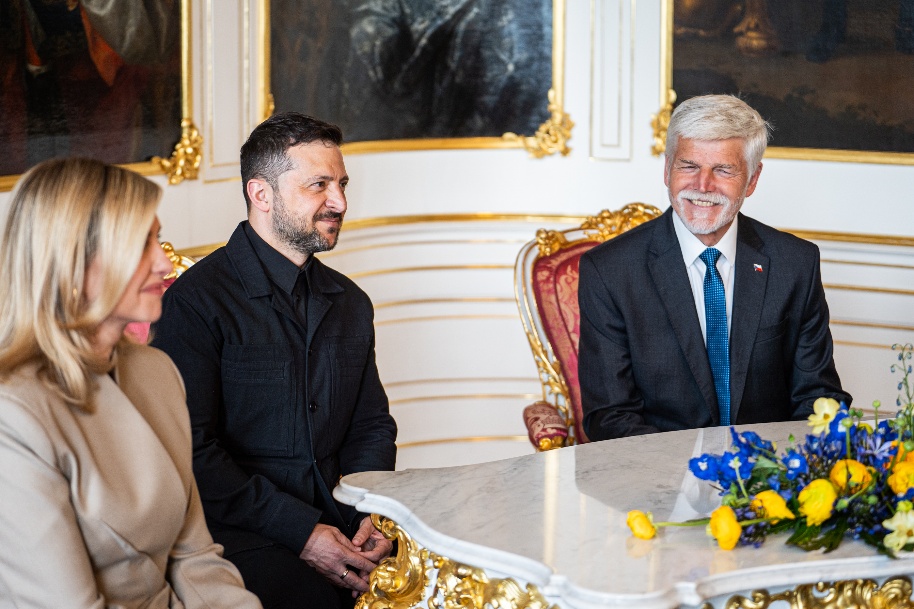
Czech President Petr Pavel and Ukrainian President Volodymyr Zelensky meet together in an un-formal setting during Zelensky’s official visit to Prague. They are joined by their wives First Ladies Olena Zelenska (L) and Eva Pavlová (out-of-view). (Ray Baseley/The Kyiv Independent)
The Kremlin’s True Intentions: Putin Reaffirms Maximalist War Aims
In a revealing documentary released on Russian state TV channel Rossiya 1 on May 4, Vladimir Putin made clear that Russia’s objectives in Ukraine remain unchanged from the original goals of the full-scale invasion. Putin claimed Russia has sufficient resources to bring the war to its “logical conclusion with the result that Russia needs,” while insisting that “reconciliation with the Ukrainian part of the Russian people is inevitable.”
These statements expose Putin’s continued denial of Ukrainian nationhood, as he repeatedly frames Ukrainians as merely a “subset of Russians.” Russian state media pointedly highlighted Putin’s longstanding claim that Russians and Ukrainians are “one people”—a narrative used to justify the invasion and occupation of Ukrainian territory.
The Kremlin’s unchanging objectives still include demilitarizing Ukraine, installing a pro-Russian government, forcing Ukraine to abandon NATO aspirations, and compelling massive territorial concessions—including areas Russia does not currently occupy. In essence, Putin continues to demand Ukraine’s total capitulation, even as American and Ukrainian officials attempt to negotiate a pathway to peace.
War on the Home Front: Russian Drones Strike Kyiv, Injuring Eleven
A wave of explosions rocked Kyiv overnight as Russia launched a drone attack against the Ukrainian capital on May 4. At least 11 people were injured in the attack, including two children aged 14 and 17, according to Kyiv City Military Administration head Tymur Tkachenko.
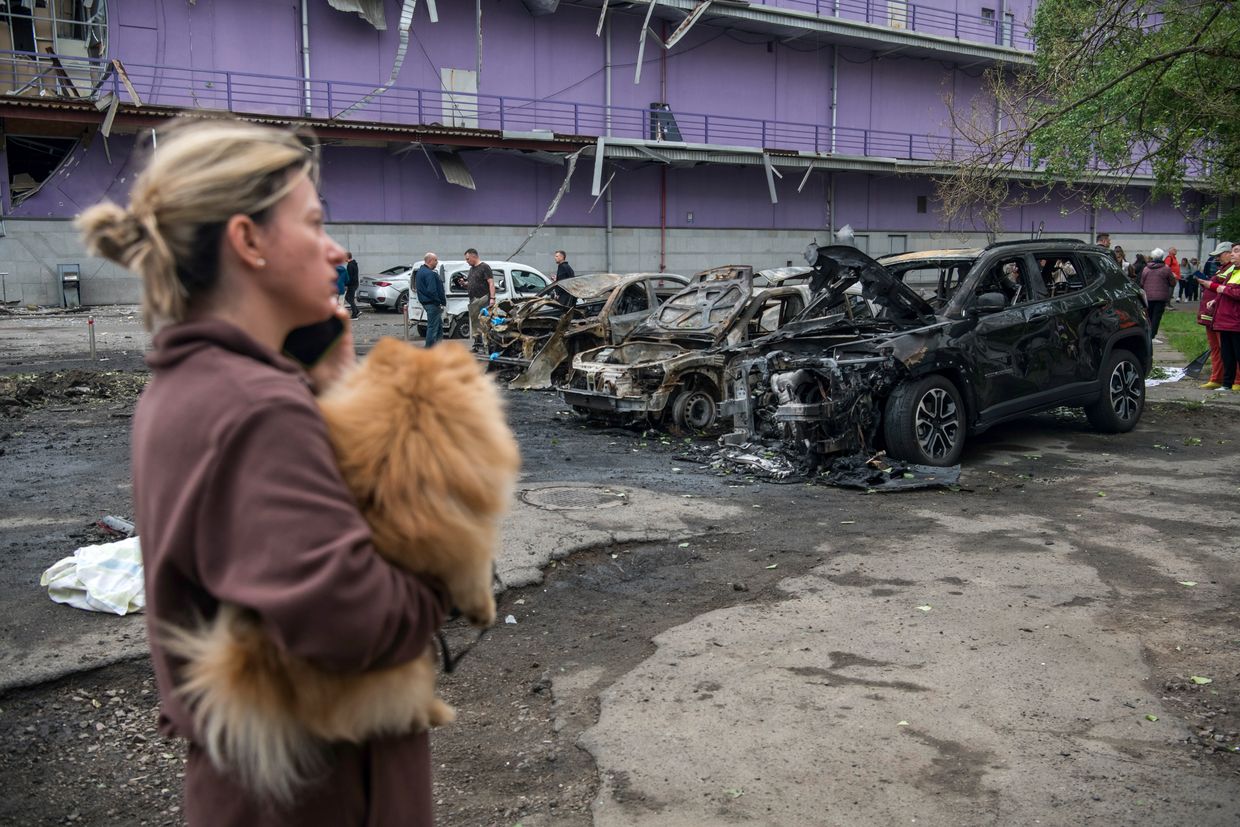
Local residents inspect the aftermath of a Russian drone attack on a residential area in Kyiv, Ukraine. (Maxym Marusenko/NurPhoto via Getty Images)
Debris from the drones damaged several houses and vehicles across multiple districts of Kyiv, including Shevchenkivskyi, Obolonskyi, and Svyatoshynskyi. In the Obolonskyi district, the Dream Town shopping mall was damaged, and at least seven cars and the upper floors of a high-rise building caught fire.
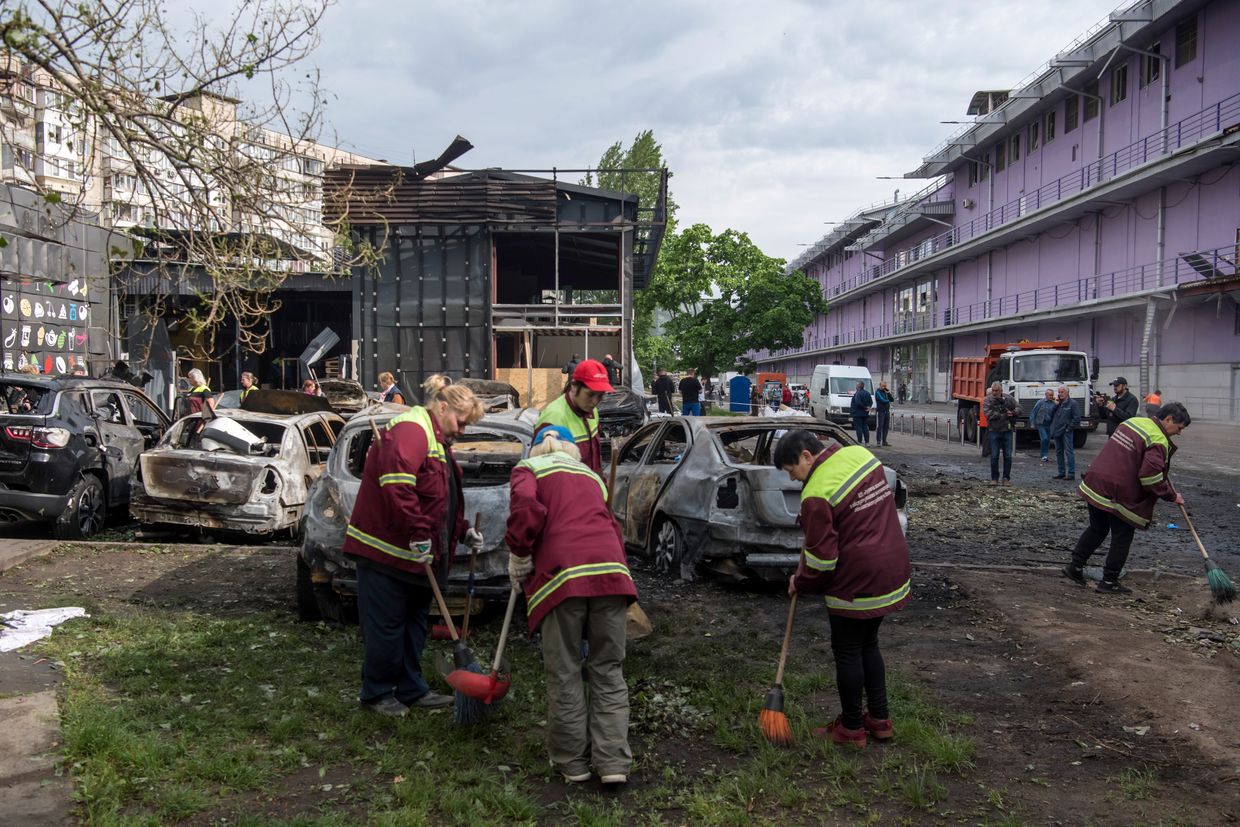
Municipal workers clean up debris after an overnight Russian drone attack on a residential neighborhood in Kyiv, Ukraine. (Maxym Marusenko/NurPhoto via Getty Images)
“There is absolutely nothing here, not even theoretically, that could be considered a military target. There aren’t even any industrial facilities,” said Kyrylo Fesyk, head of the Obolon District State Administration. “There’s just a large, well-known mall, children’s centers, and small businesses.”
First responders were dispatched to the affected areas, with emergency crews working through the morning to address the aftermath of the attack, which came amid continued Russian bombardment of civilian areas across Ukraine.
Civilian Voices: “I Just Hate Them” — Kyiv Residents React to Morning Attack
“How do I feel now? I just hate them (the Russians). That’s it,” said Halyna Kryvoruka, 36, as she surveyed the damage to her seventh-floor apartment in Kyiv’s Obolon district on the morning of May 4. Just minutes before a Russian drone strike shattered her windows, her husband Petro, a 34-year-old veteran, had woken her and moved them to the corridor for safety.
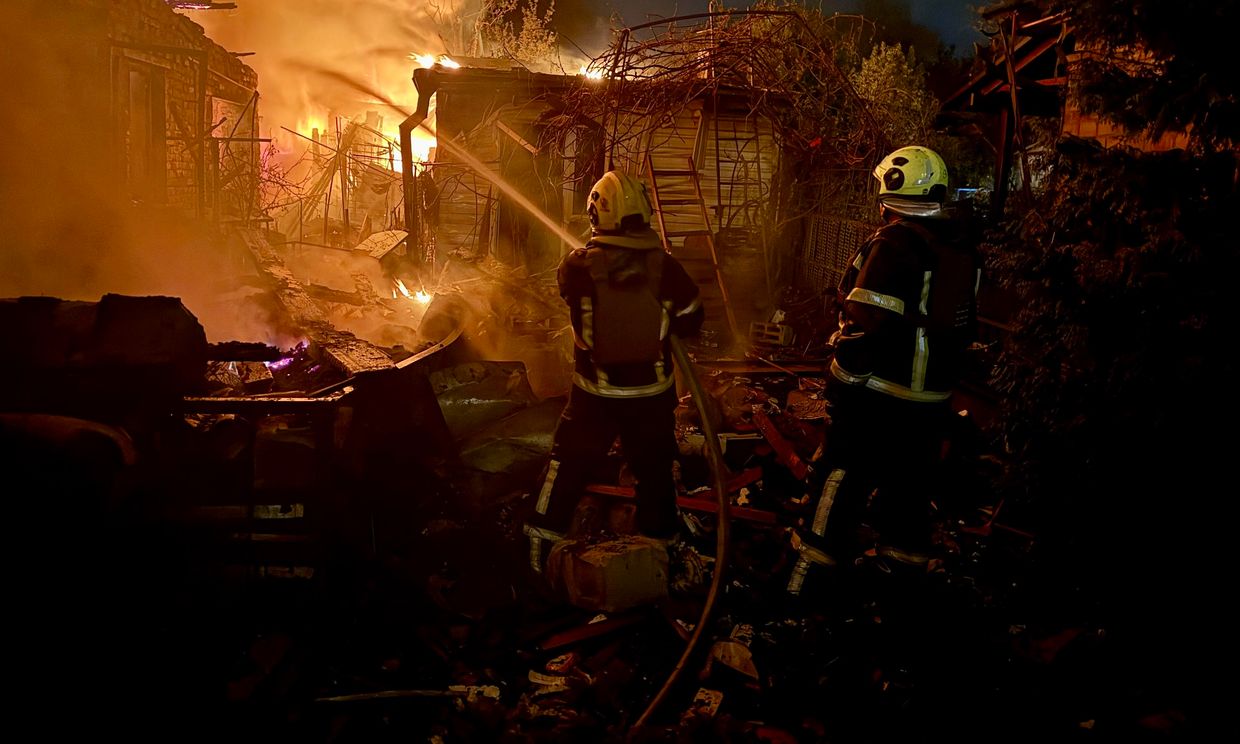
First responders work at the site of Russian drone attack in Kyiv overnight. (State Emergency Service / Telegram)
Glass covered the couch where Halyna had been sleeping just minutes earlier, and the couple’s car was destroyed in the blast. “It’s a piece of iron. Thank God we are alive,” she said.
“It’s upsetting that these situations keep happening,” Petro Kryvoruka continued, leaning on his cane. He returned from the front lines after being wounded two years ago. “These bastards—there’s really no other word for them—just don’t want to calm down, and it’s the civilian population that suffers. While they sit there negotiating, playing tug-of-war, it’s civilians who are paying the price.”
The attack struck a quiet residential neighborhood in Obolon, damaging the Dream Town shopping mall, a beauty salon, a supermarket, and a nearby kindergarten. Several burned-out cars surrounded the crater left by the drone strike, with one belonging to the Kryvoruka family.
National Death Toll: Four Killed, Thirty Wounded in Attacks Across Ukraine
At least four people were killed and 30 injured in Russian attacks across Ukraine on May 4, regional authorities reported. In Donetsk Oblast, Russian forces killed two residents in Komar and one in Myrnohrad. A man was killed and four women injured in Kupiansk, Kharkiv Oblast, as four localities in the region came under attack.
Nine people were wounded in Kherson Oblast after Russian troops hit residential areas and critical infrastructure, damaging two apartment buildings, nine houses, and other infrastructure. Two police officers were injured in Dnipropetrovsk Oblast during a Russian drone strike, which damaged three businesses, two apartment buildings, and several houses. At least two people were also injured in Zaporizhzhia Oblast.
The attacks came as Russia launched 165 drones overnight, including Iranian-designed Shahed-type drones. Air defenses shot down 69 drones, while 80 vanished from radars—likely used as decoys to overwhelm Ukraine’s defenses. The assault was countered with electronic warfare units, aviation, anti-aircraft missile systems, and mobile fire groups.
Strategic Strike: Ukrainian Drones Hit Russian Defense Industrial Base
Ukrainian forces struck a Russian defense industrial base enterprise in Bryansk Oblast on May 4. Ukrainian Center for Countering Disinformation Head Lieutenant Andriy Kovalenko reported that unspecified drones struck the Strela Plant in Suzemka, Bryansk Oblast. Kovalenko stated that the Strela Plant produces electronic components and radar equipment for the Russian defense industrial base.
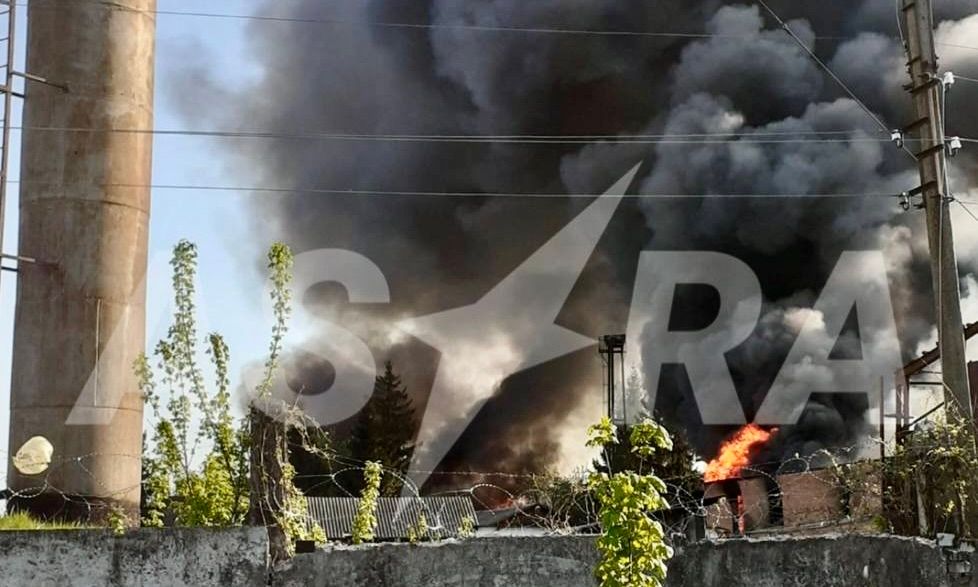
Smoke rises over the site of a reported attack at the Strela electromechanical plant in Russia’s Bryansk Oblast. (Astra / Telegram)
Bryansk Oblast Governor Alexander Bogomaz claimed that Ukrainian drone strikes caused a fire at an industrial enterprise in Suzemka. “There was a fire at an industrial plant, production and administrative buildings were destroyed. There are no casualties,” Bogomaz wrote on his official Telegram channel.
Russian pro-government media reported that the attack destroyed two workshops and sparked a fire covering an area of 250 square meters, severely damaging critical infrastructure of the plant. Kovalenko claimed the facility can no longer operate following the strike, removing a key contributor to Russia’s military-industrial complex.
Czech Artillery Initiative: Zelensky Secures 1.8 Million Shell Commitment
The Czech ammunition initiative will deliver up to 1.8 million artillery shells to Ukraine by the end of 2025, Czech President Petr Pavel announced on May 4 during President Zelensky’s official visit to Prague. This represents an additional 300,000 shells beyond what Prague had previously committed to earlier this year.
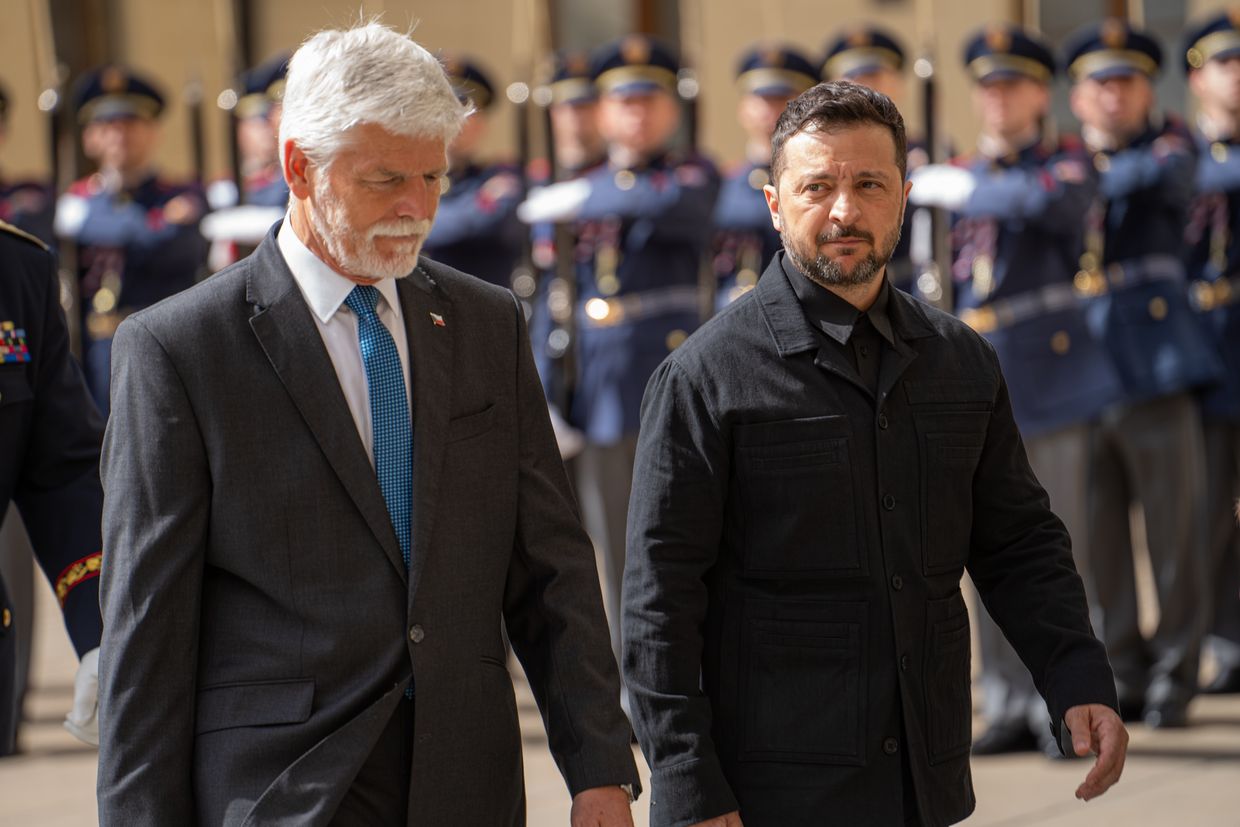
Czech President Petr Pavel welcomes Ukrainian President Volodymyr Zelensky in the first courtyard of the Prague castle during Zelensky’s official visit. (Ray Baseley/The Kyiv Independent)
The initiative, supported by contributions from Canada, Norway, the Netherlands, Denmark, and other countries, has significantly boosted Ukraine’s artillery capabilities, improving the shell ratio from 1-to-10 in Russia’s favor to 1-to-2, according to Pavel. The effort was launched last year amid Ukrainian shell shortages, primarily caused by delays in U.S. military aid.
President Zelensky arrived in the Czech Republic on May 4 for his first visit to the country since July 2023. During the visit, the leaders discussed additional areas of cooperation to support Kyiv’s fleet of F-16 fighter jets. Czech Health Minister Vlastimil Valek also announced that Czechia and Ukraine will sign a memorandum on mental health cooperation.
Pavel noted that Prague intends to deliver additional shells next year, but decisions will depend on the results of this year’s parliamentary elections. Zelensky’s visit includes planned meetings with Czech opposition members on May 5, an important diplomatic effort as Czechia’s leading opposition party, ANO, has indicated it aims to suspend the ammunition initiative if it wins the parliamentary elections in October 2025.
Air Defense Reinforcement: Patriot System from Israel Headed to Ukraine
A Patriot air defense system based in Israel will be transferred to Ukraine after refurbishment, according to a New York Times report on May 4 citing four current and former U.S. officials. Western allies are also discussing supplying additional systems from Germany or Greece as Russia escalates its attacks across Ukraine.
The decision comes as Ukraine has consistently pressed Western partners to bolster its air defenses. According to the New York Times, Ukraine currently has eight Patriot systems, of which only six are operational, with the remaining two undergoing refurbishment. The highly advanced Patriot systems have proven crucial in protecting Ukrainian airspace, capable of downing even the most sophisticated ballistic missiles.
The sources declined to elaborate on President Donald Trump’s stance on the decision or clarify whether the move was initiated during former President Joe Biden’s administration. The report noted that Trump’s position on Ukraine aid has evolved since taking office, with the administration now apparently supporting this significant air defense enhancement.
Trump’s Leverage: U.S. President Ties Sanctions to Peace Progress
U.S. President Donald Trump indicated in an interview with NBC News on May 4 that the U.S. may implement additional sanctions against Russia if it does not reach a peace deal with Ukraine. When asked if Trump would sign a sanctions bill touted by Senator Lindsey Graham, Trump said “it depends on whether or not Russia is behaving toward coming to a peace.”
“We want a peace deal. We want Russia and Ukraine to agree to a deal. We think we’re fairly close, and we’re going to save a lot of people from being killed,” Trump continued. He expressed cautious optimism about peace negotiations but acknowledged challenges: “I do believe we’re closer with one party, and maybe not as close with the other. But we’ll have to see.”
Trump’s comments represent a potential shift in his approach to Russia, suggesting he may be willing to use economic pressure if diplomatic efforts fail to produce results. The possibility of “bone-crushing” sanctions, as described by Senator Graham, could become a significant factor in calculations by the Kremlin as peace talks continue to develop.
Xi’s Victory Day Visit: China’s Leader to Meet Putin in Moscow
The Kremlin announced on May 4 that Chinese President Xi Jinping plans to meet with Putin during Moscow’s Victory Day celebrations between May 7-10 and “sign a number of bilateral inter-governmental and inter-departmental documents.” “The bilateral talks to be held during the visit will focus on the core aspects of further advancement of Russia-China relations of comprehensive partnership and strategic cooperation, as well as pressing matters on the international and regional agendas,” the Kremlin stated.
China has positioned itself as Russia’s key international partner throughout the full-scale invasion, becoming Moscow’s leading supplier of dual-use goods that bolster Russia’s defense industry. While officially claiming neutrality and positioning itself as a potential mediator, China has simultaneously criticized the U.S. and its allies for “exacerbating” the war by supplying weapons to Ukraine.
The timing of Xi’s visit coincides with Russia’s Victory Day celebrations, which the Kremlin uses for propaganda purposes, showcasing its military might and drawing on the Soviet victory in World War II to justify its aggression against Ukraine. The planned meetings and document signings indicate a further deepening of Russia-China relations amid Western pressure and sanctions.
After Putin: Russian President Admits Active Succession Planning
Russian President Vladimir Putin revealed on May 4 that he constantly considers potential successors and confirmed he has a list of candidates, according to a segment of a new pro-Putin regime documentary titled “Russia. Kremlin. Putin. 25 Years” released on May 4.
In an interview with pro-Russian state journalist Pavel Zarubin for the documentary, Putin confirmed he assesses the potential of each possible successor. “Yes, I do,” he replied when asked directly. The Russian president stressed that any successor must earn “the trust of the people,” warning that without it, a future president would have “no chance to do anything seriously.”
He added, “There should be a person—and preferably several, so that people have a choice—who could achieve this trust from the citizens of the country.” This rare acknowledgment of succession planning comes as Putin, now 72, has ruled Russia for over 25 years, with constitutional amendments passed in 2020 enabling him to potentially remain in power until 2036.
Ideological Preparation: Putin Frames War as Moral Struggle for Russia’s Future
Putin’s documentary appearance on May 4 featured attempts to frame domestic support for the war through shared values, despite Russia’s heavy reliance on financial incentives to maintain its military recruitment and war effort. The Russian leader claimed that each citizen now realizes “he is the state” and that Russia’s survival depends on individual sacrifice.
In portraying Russia as a country of “moral and ethical values” where “the family, the state, and the future of Russia” form the core of national consciousness, Putin is laying ideological groundwork for prolonged conflict. He again accused the West of “deceiving” Russia following the 2015 Minsk agreements, reinforcing his narrative that Russia cannot negotiate with Western powers and must persevere independently.
These rhetorical flourishes align with Russia’s broader efforts to militarize society, from declaring 2025 the “Year of the Defender of the Fatherland” to creating programs that elevate veterans to an “elite” class. Russia continues to invest heavily in military-patriotic education for youth, demonstrating the Kremlin’s commitment to cultivating a new generation of militarized, loyal citizens for the long term.
Diplomatic Strategy: Poland and Baltics Prepare Plan for Peace Negotiations
Foreign ministers from Poland, Lithuania, Latvia, and Estonia indicated on May 4 that they are working together on a collective strategy to address potential peace negotiations regarding the Russia-Ukraine conflict. This initiative comes amid concerns about American-led efforts that may not fully address the security interests of countries on NATO’s eastern flank.
The strategy aims to help coordinate a common approach to negotiations, with special focus on ensuring Ukraine’s territorial integrity and securing long-term stability in the region. The Baltic nations and Poland, which share borders with Russia or Russian allies, have been among the most vocal supporters of Ukraine and have consistently advocated for strong international response to Russian aggression.
The joint diplomatic effort underscores the growing influence of regional powers in shaping the future security architecture of Eastern Europe, reflecting their determination to have a seat at the table in any discussions that could affect their national security interests.
Mental Health Initiative: Ukrainian-Czech Cooperation to Address War Trauma
Czech Health Minister Vlastimil Valek announced on May 4 that Czechia and Ukraine will sign a memorandum on mental health cooperation during President Zelensky’s visit. The agreement will include human resources exchanges for experience-sharing as well as an undisclosed investment to support mental health assistance for Ukraine.
The initiative acknowledges the severe psychological toll the ongoing war has taken on Ukrainian civilians and military personnel, with experts estimating millions of Ukrainians suffering from various forms of trauma-related conditions after more than three years of full-scale invasion. The Czech Republic’s expertise in psychological rehabilitation programs will provide valuable support to Ukraine’s overstretched mental health services.
“This cooperation will extend beyond the immediate crisis response to help build Ukraine’s long-term capacity for addressing trauma in both civilian and military populations,” Valek stated during the announcement in Prague, highlighting that mental health recovery will be a crucial component of Ukraine’s post-war reconstruction efforts.
Romanian Election: Far-Right Candidate Leads Presidential First Round
Far-right Eurosceptic candidate George Simion was projected to win the first round of Romania’s presidential election on May 4, gaining nearly 40% of the votes with a majority of polling stations reporting. The election will go to a run-off on May 18, with Simion facing either Crin Antonescu, the former acting president backed by Romania’s governing coalition, or Nicusor Dan, Bucharest’s mayor running as an independent with a strong anti-corruption platform.
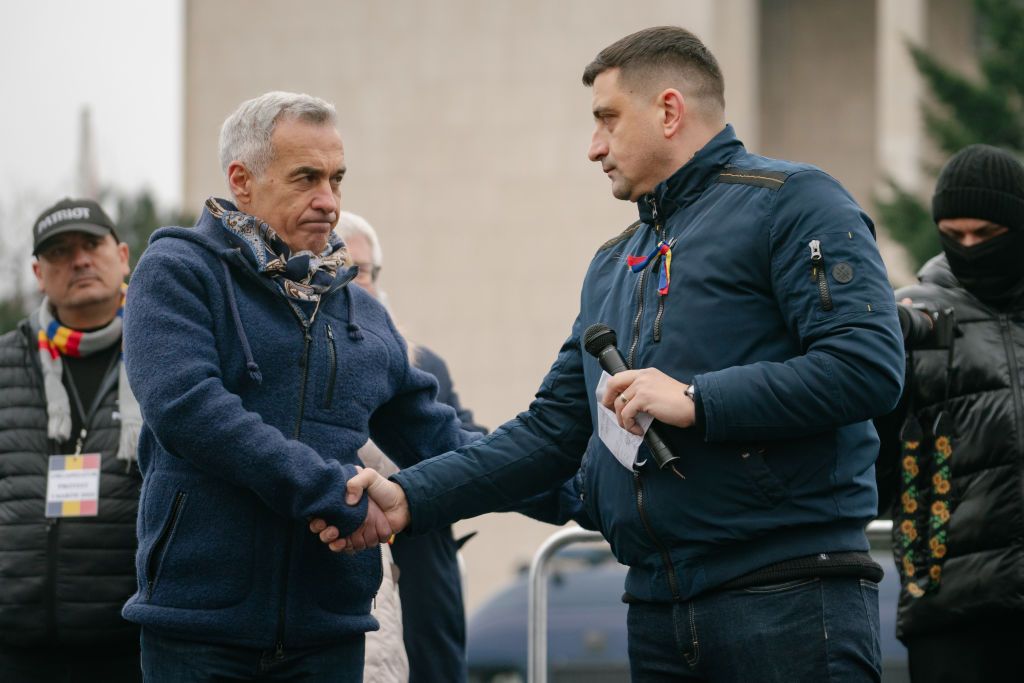
The leader of the far-right party AUR, George Simion (right) shakes hands with former presidential candidate Calin Georgescu (left) during an anti-government rally in Bucharest, Romania. (Andrei Pungovschi/Getty Images)
With most votes counted, Simion had 39.97% of the vote, while Antonescu was leading Dan by a narrow margin of 20.96% to 20.04% for the second-place position. The vote follows the annulment of the previous first round held in November 2024, which was invalidated by Romania’s Constitutional Court due to evidence of social media manipulation and foreign interference.
Simion, who was banned from entering Ukraine in November 2024 over systematic anti-Ukrainian activities, leads a party opposed to sending weapons to Ukraine and against transferring Romanian Patriot air defense systems to Kyiv. Both Antonescu and Dan support continued membership in the EU and NATO, as well as aid to Ukraine, making the outcome of the second round potentially significant for Ukraine’s international support network.
Washington Spectacle: Pro-Russian Rally Draws Ukrainian Counter-Protest
Pro-Russian demonstrators staged an Immortal Regiment rally in Washington, D.C. on May 4 to mark 80 years since the end of World War II—the first such event in the U.S. capital in six years. Ukrainian nationals organized a protest in response, according to representatives of the Ukrainian Cultural Front D.C.
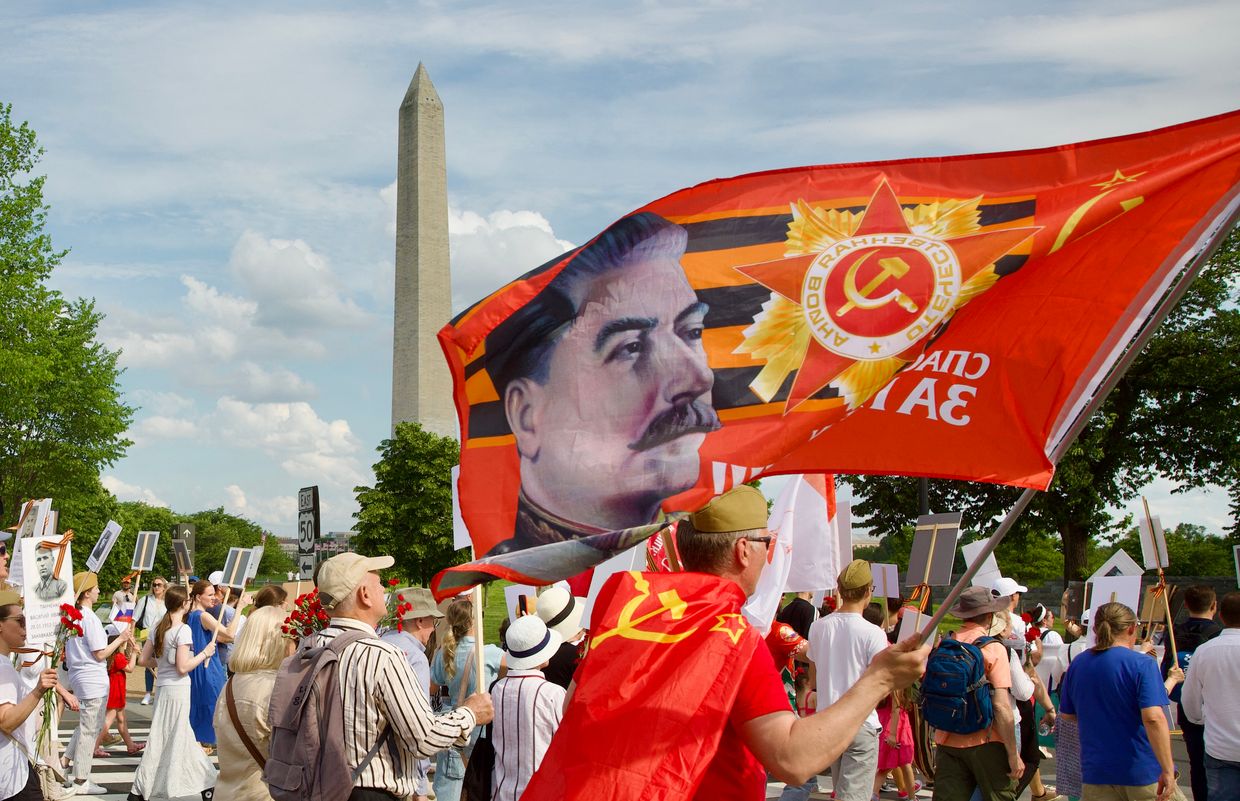
Russian activists wave a Stalin flag as they walk by the Washington Monument in an “Immortal Regiment” march in Washington, D.C. (Amid Farahi / AFP via Getty Images)
The rally, which began at Lafayette Square Park near the White House and ended at the World War II Memorial, was guarded by Washington police who blocked streets and secured the participants. Ukrainian protesters carried flags and posters with messages like “Putin is wanted for genocide,” “Honor the dead, bring Russia to justice,” and “Putin = Hitler.”
“That’s the crazy reality. We have a Russian march in the middle of Washington, D.C., the capital of the United States… Justifying war crimes seems fine,” said Marichka Hlyten, an activist with the Ukrainian Cultural Front D.C. Ukrainian protesters also displayed a photo of Ukrainian journalist Viktoriia Roshchyna, who was reportedly tortured in Russian captivity.
An activist told Ukrainian media that Russian journalists covering the event kept their distance from the Ukrainian protest to skew coverage for domestic audiences, highlighting how the event served as a propaganda opportunity for Moscow even on American soil.
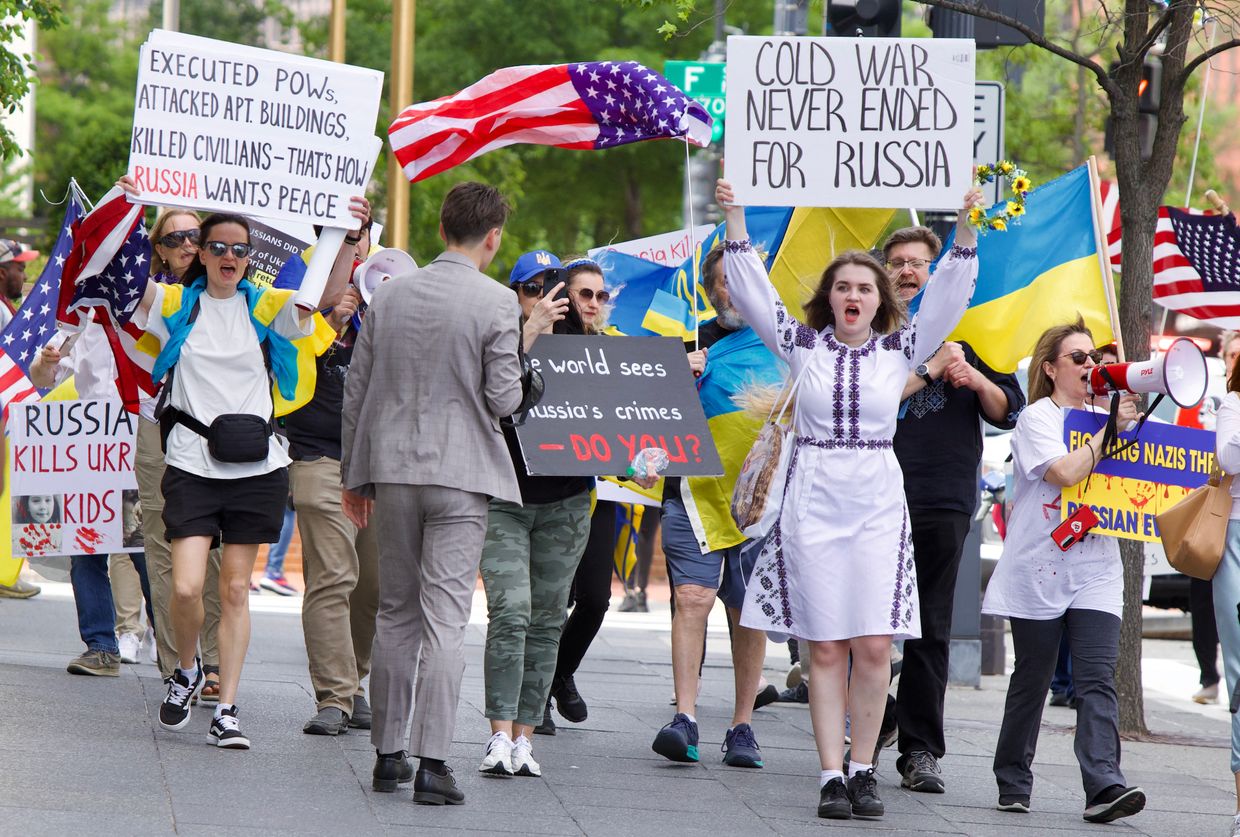
Counter-protesters gather as Russian activists take part in an “Immortal Regiment” march to mark the 80th anniversary of the end of the “Great Patriotic War” (Amid Farahi / AFP via Getty Images)
Battlefield Movements: Ukrainian and Russian Forces Exchange Limited Gains
Ukrainian and Russian forces exchanged tactical gains across the front on May 4, with confirmed advances in several key areas. Geolocated footage published on May 4 indicates that Ukrainian forces recently advanced in southern Novospaske, west of Toretsk, while Russian forces advanced south of Stara Mykolaivka, southwest of Toretsk. Russian forces also recently advanced northwest of Zapadne, north of Kupyansk.
In the Sumy direction, Russian forces continued offensive operations on May 4 but did not make confirmed advances. Fighting continued north of Sumy City near Bilovody and Vodolahy and northeast of Sumy City near Loknya.
Russian milbloggers claimed on May 4 that Ukrainian forces maintain a limited presence in northwestern Belgorod Oblast near Popovka and Demidovka. Limited fighting continued in Kursk Oblast as Russian forces attempted to push Ukrainian forces from the area.
Russian forces conducted offensive operations near Toretsk; west of Toretsk near Druzhba; north of Toretsk near Dachne, Dyliivka, and Krymske; and southwest of Toretsk on May 4, but neither side made dramatic breakthroughs that could change the strategic balance.
Strengthening Alliances: International Support Counters Russian Aggression
As May 4 draws to a close, the day’s events demonstrate the continued commitment of Ukraine’s international partners to bolster its defensive capabilities, even as Russia escalates attacks on civilian targets. From the Czech Republic’s pledge of 1.8 million artillery shells to reports of an additional Patriot system from Israel, the material assistance announced today represents crucial lifelines for Ukraine’s defensive efforts.
Ukrainian citizens and officials remain resolute despite the challenges. Wounded veteran Petro Kryvoruka, surveying his shattered Kyiv apartment, expressed the determination that drives Ukrainian resistance: “What are we even fighting for if we end up having to give something away? Our people won’t understand why we’re dying, getting injured, and living the rest of our lives disabled.”
While Putin’s documentary appearance reveals Russia’s preparations for prolonged conflict through ideological framing and nationalist messaging, Ukraine’s growing network of international support continues to develop. The contrast between Russia’s bombing of civilian neighborhoods and shopping malls and the diplomatic, military, and humanitarian support flowing into Ukraine highlights the fundamentally different approaches to resolving the conflict, with Russia relying on force while Ukraine builds alliances.
